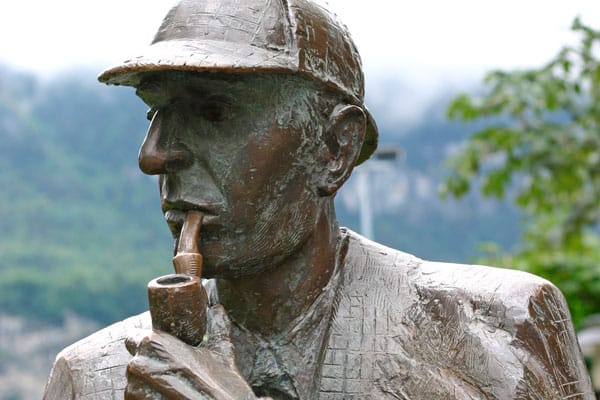Ancestors moved, names were changed… they still tell a story, but it may not be the one you expect. On two recent occasions I met people who had been told their family was English or at least from the British Isles. That doesn't sound unusual, except that in neither case was the family, in fact, British.
People often moved around within the British Isles. Nobody finds it strange that Sir Arthur Sullivan of Gilbert and Sullivan fame, or Arthur Conan Doyle, the creator of Sherlock Holmes, were Englishmen with Irish family names. No one comments on Irish authors with British names, such as Shaw and Wilde, Swift and Goldsmith. Ancestors moved and intermarried-surnames suggest a heritage other than the one people believe they have. My family has a name that seems English, but it actually belonged to a Frenchman who lived in Wales, yet my great-grandfather believed he was Irish.

As time elapses people forget their origins, assuming they'd ever known them. Their names changed or were changed for any number of reasons. Polychronopolos changed to Poulos or even to Poole, perhaps because one grew tired of spelling his name for people. Quite often people chose an English-sounding name that retained an element of their former name. Either it sounds similar, or it is shorter and more familiar in the adopted country.
Another time-honoured tradition is to translate a name into its English equivalent. Thus LeBlancs became Whites, and Wedges may have been Aucoins, while quite a few of the Cook families in the Maritimes hearken back to a German ancestor named Koch, and just as many Baker families had been Becker.
Even Scottish Highlanders sometimes gave up trying to educate the Sassenachs (Englishmen), and anglicized their names. Mac means "son of," so a Gaelic-speaker named MacDonald sometimes dropped the Gaelic "Mac" and tacked on its English equivalent. Et voilà: Donaldson was born. The transformation of MacGregor into Grierson and even to Grier is only a little less obvious.
More than most, names of German origin have changed by intent or design over the past 200 years or so. At first it was a matter of change made haphazardly by English-speaking clerks asking people who could not read and write in English to give their names. A generation or two after that, some German people began to use simpler, English spellings.
Then came the two World Wars; families who had already "smoothened out" the foreignness of their names stopped telling their children about ancestors from Hesse or the Palatinate, Hamburg or Baden. How convenient it was that the German word for German-Deutsch-sounded like the English word for a Netherlander-Dutch.
A long time ago the Herbigs and the Gottliebs became the Harveys and the Cutlips. The Schisterns had been Sefferns for what seemed like ages and only a good genealogical sleuth would know that some among the Wrights and Rectors had once been Reigels and Richters. The Pulsifers were English, but the Publicovers were German. I've even discovered an Edwards whose ancestor was called Schwartz.
Another group of Atlantic Canadians has "English" ancestry that leads right back to the French Huguenot refugees of the 16th, 17th and 18th centuries. Their names may sound vaguely French, but then again they may not. Does Fanjoy sound French? It originates in Burgundy. Here are a few surnames in our region that may have unsuspected Huguenot ancestry: Angevine, Bonnell, Cottrell, Dabney, Lambert, Lemmon, Millet, Olive, Pineo, Soulis and Trench.
Anyone who takes up genealogy needs to dig around the roots of the family tree a bit, just in case…. Who knows, perhaps the name Caleb, so popular in your family a few generations ago, doesn't indicate roots in Christian New England but instead traces back to how Gottlieb made his name sound more English. A canny researcher keeps an open mind.
So you see, Clotworthy Skeffington was an Irish lord; Cloudesley Shovel was an English admiral. Or was it t'other way round?
Dr. Terrence M. Punch is the resident genealogist on CBC Radio and editor of Genealogist's Handbook for Atlantic Canada Research.
